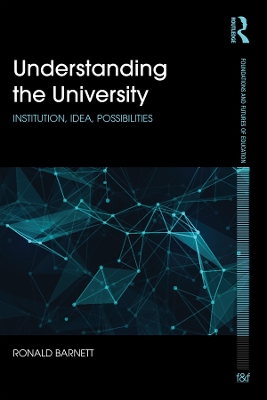Foundations and Futures of Education
2 total works
There is no single idea of the university. Ever since its medieval origin, the concept of the university has continued to change. The metaphysical university gave way successively to the scientific university, and then to the corporate and the entrepreneurial university. But what, then, might lie ahead?
Being a University both charts this conceptual development and examines the future possibilities for the idea of the university. Ronald Barnett pursues this quest through an exploration of pairs of contending concepts that speak to the idea of the university - such as space and time; being and becoming; and culture and anarchy. On this foundation is developed an imaginative exposition of possible ideas of the university, including the liquid university and the authentic university.
In the course of this inquiry, it is argued that:
Any thought that the idea of the entrepreneurial university represents the end-point of the evolution of the idea of the university has to be abandoned. The entrepreneurial university is excessively parochial and ill-matched to the challenges facing the universityA responsibility of the university is precisely that of working out an imaginative conception of its future possibilities. The boldest and largest thinking is urgently requiredThe fullest expression of the university's possibilities lies in a reclamation of the universal aspirations that lay in earlier ideas of the university. The ecological university represents just such a universal aspiration, suited to the unfolding demands of the future.Being a University will be of wide interest, to institutional leaders and managers, higher education planners, academics in all disciplines and students of higher education, in educational policy and politics, and the philosophy, sociology and theory of education, and indeed, anyone who believes in the future of the university.
Understanding the University constitutes the final volume in a trilogy - the first two books having been Being a University (2010) and Imagining the University (2012) - and represents the trilogy's ultimate aims and endeavours. The three volumes together offer a unique attempt at a fairly systematic and exhaustive level to map out just what it might be seriously to understand the extraordinarily complex entity that is known across the world as 'the university'.
Through examination of the conditions and possibilities underlying and affecting universities, this work offers an understanding of specific ideas of the university which can inform policies, strategies and practices in relation to the university.
This book is a must read for leaders and senior managers in universities , as well as those undertaking postgraduate studies in the policy and practice of higher education.

